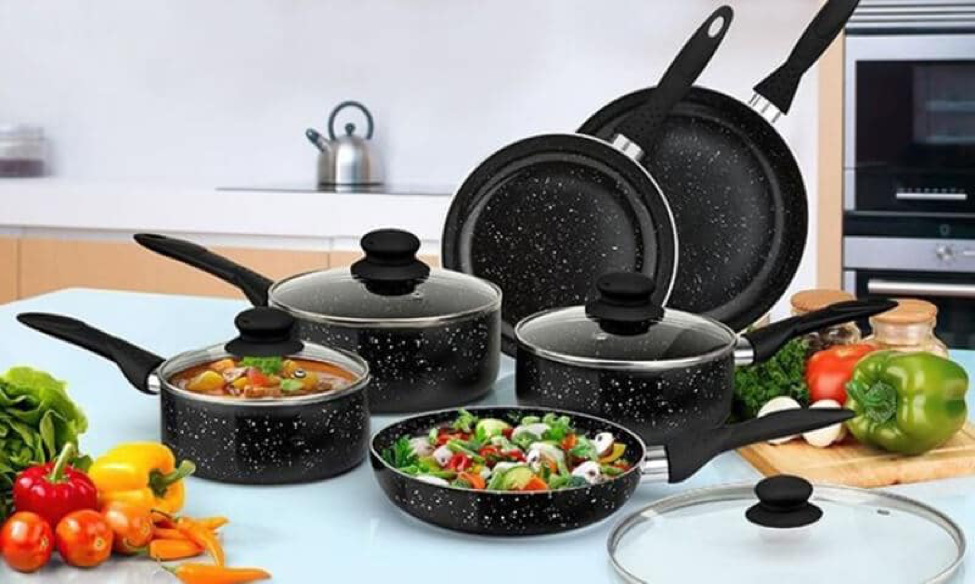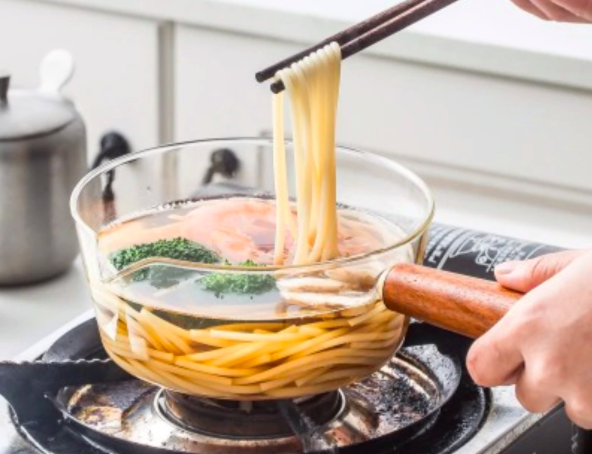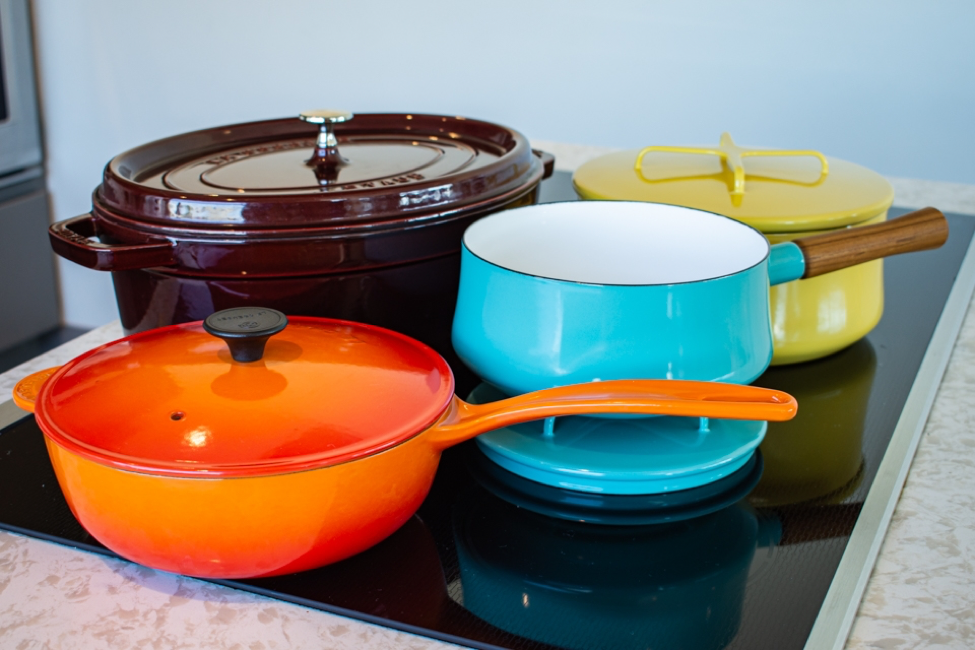It can be quite challenging to shop for home and kitchen equipment. There are many different options to choose from, and you can be sure to find the available colors and designs that make it difficult to determine which to pick. When it comes to cookware, you can be sure to be in a rot when selecting from the lot.
One important thing to note when in the market for pots and pans is the material used in its fabrication. While you will need to care for your kitchen utensils to get them to last long, you first have to shop for the best kind. You can find more on this website about getting your utensil to last long. Before I let you on some tips on buying cookware, let’s first discuss the different material options available.
#1 Stainless Steel
Stainless steel is used to produce many household utensils, including many of the best quality pots and pans in the market. You can also find cutlery and gadgets that also feature stainless steel in their build. And this is as a result of the high resistance to corrosion. Another reason steel material is used in cookware is its high resistance to wear and tear, which is typical for most kitchen utensils.
Pros
- Highly durable
- Easy to maintain
- Steel is attractive
- Doesn’t contaminate the food
- It heats up pretty fast
- Dishwasher and oven safe
Cons
- Slow in heat distribution
- Food sticks to the material, especially when overcooked/burnt.
#2 Carbon Steel
You can also cookware made from carbon steel. It is good at retaining heat, which makes it an excellent material for deep fryers where you need the heat to be evenly spread. They are equally as durable as stainless steel and can last long with proper maintenance. However, they may be heavier than other utensil material types, but this does not affect the handling.
Pros
- Long-lasting
- Easy to handle
- Retains heat
- Fairly resistant to sticking
Cons
- A little complicated to maintain
- Susceptible to rusting
- Requires seasoning of the utensil to prevent contamination of food when cooking with carbon steel.
#3 Aluminum

Aluminum also makes an excellent material for kitchen utensils as it is a good conductor of heat. So you can ensure to get your catering done in quick time with aluminum. Most manufacturers would include other materials in their aluminum cookware. And some other additives here could be copper, magnesium, or a different type of metal.
Pros
- Aluminum is lightweight
- Easy to clean
- Good conductor of heat
- Affordable
- Durable
- Resistant to scratch
- Fairy non-stick
Cons
- May react with the food
- Requires special care to maintain
#4 Cast Iron
Although a poor conductor of heat, you can still find cookware that features it in their design. This means your food will take longer with this material, but there are other reasons why most people consider it when in the market for kitchenware. In most cases, they would opt for one with an enameled coating to help with rust prevention. But this only adds to its weight, making utensils made from this material a lot heavy.
Pros
- Durable
- Resistant to rust
- Non-stick material
- Affordable
- Easy to maintain
Cons
- Weighs a lot
- May be challenging to store
- Not great for cooking acidic food, as it can strip off the coating contaminating the cooking in the process. To prevent this, you will need to season the utensil for rust regularly.
#5 Copper
Copper is another high-quality material for making cooking utensils. But you should know that while it is a common material in kitchenware, it is not suitable for everyday cooking. This is because it can react with your food. To reduce this tendency, manufacturers use a tin or stainless steel barrier to line the utensil to prevent stripping when cooking. Aside from this, copper is great at heat retention as suitable for most kitchen equipment.
Pros
- Durable
- Affordable
- Easy to clean
- Great heat retention
Cons
- Requires care to prevent food poisoning
- Not suitable for all utensils
- May be stressful to maintain
#6 Glass

Although not that popular, you can also find glass pots and pans. They may not be suited for everyday use since they require special handling. But when it comes to preparing those dishes where you need to be inside the casserole (look closely), you can find glass to be worth it.
Pros
- Easy to clean
- Affordable
- You can see through the cookware
Cons
- Not durable
- Requires special handling
- Doesn’t work for all meals
- Poor non-stick material
#7 Ceramic
In addition to glass, you can also find ceramic cookware for sale. In most cases, the base material is a combo of aluminum and silicone that appear like ceramic. You can find this healthy cookware material comparison to shed more light on the difference between stainless steel and ceramics in kitchenware. But whichever the case, its non-stick coating is not long-lasting, which makes them not great for all types of cuisine.
Pros
- Entirely environmental friendly
- Easy to clean
- Free of chemicals
- fairly non-stick
Cons
- Ceramic breaks and scratch easily
- Not dishwasher safe
- Non-coating strips easily
Choosing the Right Cookware Material
While most people would certainly be bothered about the price, there are other things to consider when in the market for cookware. Even though it doesn’t look like much, you want to give some serious considerations when shopping for cooking utensils. Some factors to keep in mind include
Durability
You don’t want to shop for new replacements every other month, so you want to note the quality of the material. Many of the options mentioned above can resist regular wear and tear.
Heat Conductivity
You would rely on heat to do your cooking, so you want pot and pan materials that are excellent conductors of heat.
Maintenance
You should also factor in the ease of cleaning and care of your utensil material. Those without or a reasonably good non-stick coating would surely require more cleaning effort than those with an excellent coat.
Material Stripping
It is possible to suffer food poisoning when using a material coating that strips off quickly under heat. So you want to be extra selective when picking out pots and pans.
Final Note
You can learn a lot from review sites when looking to buy kitchenware. And if you intend to shop online, you want to shop directly from the manufacturer or a trusted retailer.


18 comments
You have shared a great post which I was thinking about to write as we ladies spent half of our life in kitchen serving and cooking food but its very important that food we made is cooked in right utensil to give healthy and full nutrient to our loved ones.
Hey, tina, your blog post is very good and needed one… however, I would ask you what do you suggest for us to use on a regular basis. ? At present, I use stainless steel utensils, but I am looking from some change.
Wow such a cool post. I didnt even know there were so many kinds of cookware, thanks for this. I am not into cooking that much and I have only minimal set of cookware. However, my friends love cooking and one of them is a chef so I will definitely send this post to them.
This is such an informative post and I like the way you had explained pros and cons of each option. Personally I m reducing use of alluminium utensils in my kitchen as they are not good for health.
This is such an eye opener. I used to prefer ceramic cookware but I wasn’t aware there were other options which offered more benefits. I will be choosing the right cookware material going forward.
This is quite a detailed post on what are the best materials for cookwear, This is an angle I had never thought about ! From now on im gonna choose the right one !
Hey i must say this used to be the most confusing topic of concern for me; but after reading your post , many if my doubts have receded. I will now look in carefully & analyse before buying my cooking range . All these pointers to be kept in mind
Great post Tina. You’ve mentioned each of the type and it’s pros and cons. I use non-stickware and don’t feel like giving it up and it requires less oil and food doesn’t stick tot he pan or burn easily. With kids that seems to be the easier choice. What would you suggest?
What a relevant article and was showing it to my mom ..and she knows all this more so..I dont cook but this post really brings all the focus knowledge into one place
We use those Tefal utensils. Not sure what’s the material but they have that black coating which doesn’t allow the masala to stick. We got them as our wedding gift and still use them till date… 10 years now…
Great post. Kitchen is a place where we hold variety of appliances made of varied materials and getting to know them better through your blog was indeed great. I personally like aluminum and non stick pans to cook as food dsnt stick easily on them.
I gotta say you have a lovely collection of cookware! I love cast iron.. They are pretty and safe.
We have almost all the cookware made with the same materials. Glad to see so many detailed information on these materials. Informative post!
What a great post on the kinds of cookware. We women spend our most of the time in kitchen cooking for our loved ones, and choosing the right cookware is so important to ensure the food cooked retains nutrition too. Thank you for such an informative post.
thats so amazing to see the variety of options with pros n cons you have given. i was thinking to buy ceramic. thanks for the insights.
Tina, I used varied utensils for different dishes and yes I am yet to use ceramic in full flow. Maybe when we get used to one form of cookware then its little challenging to shift to another.
This is indeed a very helpful post. Passing it onto my friends as well. Thanks for sharing this information.
I have been using a mix of stainless steel cookware and Tefal for quite some time and I am very happy with the result.